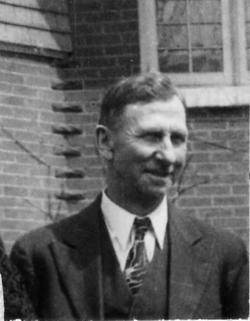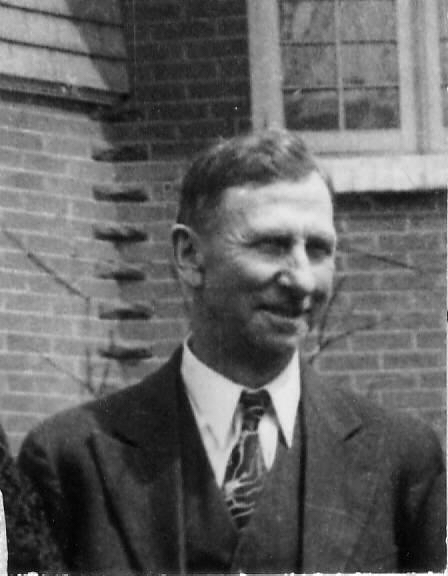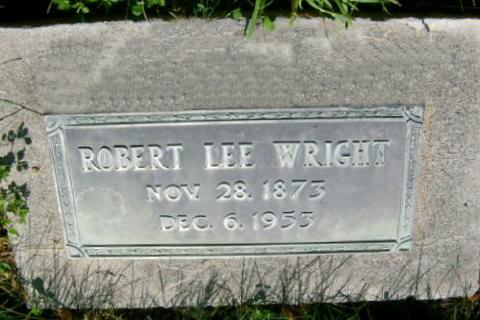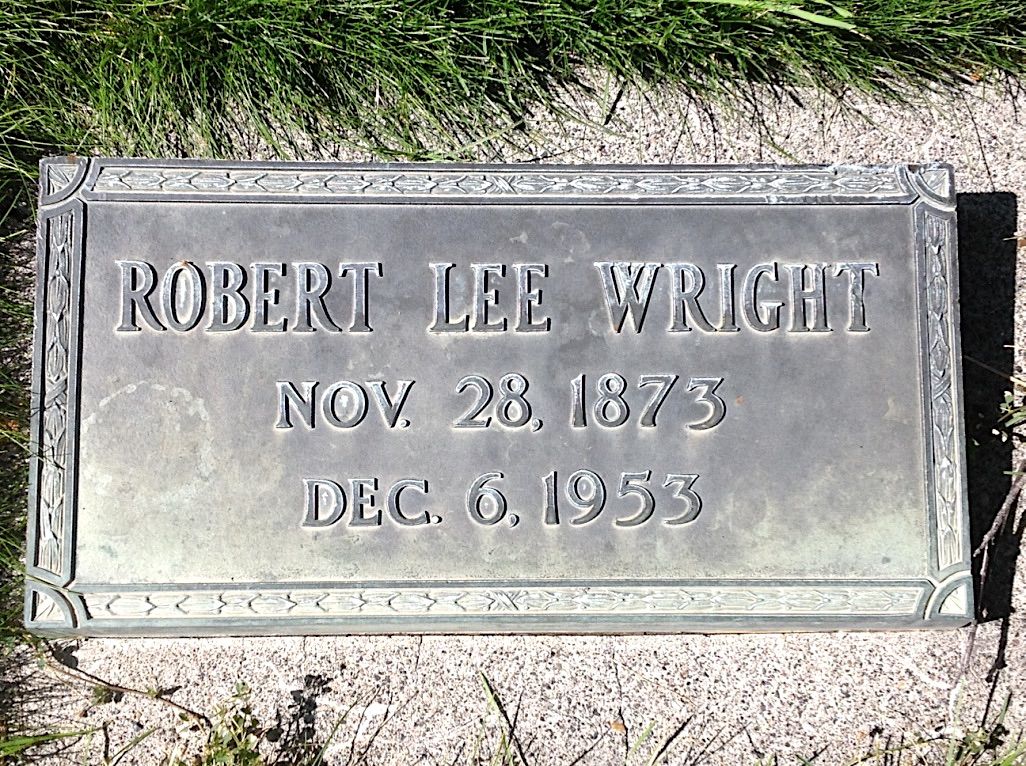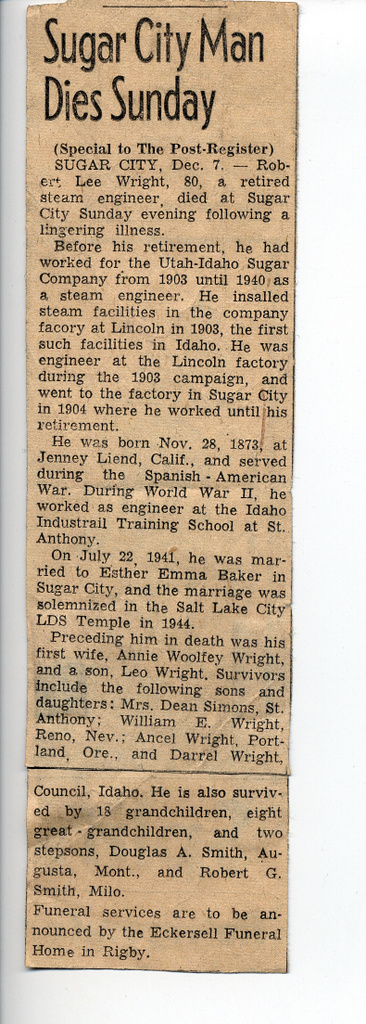Bob's mother died when he was not quite two years old. He and his two surviving brothers and a sister went to Ogden to live with his Butler grandparents for at least five years, as they were still there in 1880. He was not baptized into the Mormon church until 1896, when he was in his 20s, so it is assumed he left Ogden before he turned eight, the usual date of baptism. Their father married young Sarah Davis two years after Emily died and they had three more daughters.
Bob Wright said he worked for the L.V. Shipey Racing Stables, the Miller & Lux Ranches, on a riverboat on the Stockton River in California, for the Wheeler Company and Moore & Hunt cattle companies. In other words, a cowboy! That is what he was doing when he met his future bride. After his marriage to Annie, Bob worked for a few years for the Oregon Short Line Railroad in Montana.
In 1903 he began working for the Utah-Idaho Sugar company at Idaho Falls, and then in 1904 went to the Sugar City factory as a combustion engineer, where he remained for the next 36 years. In 1940 he retired from U-I Sugar; his wife of 40 years died that same year, and a year later he married Esther Baker Woolsey, who was previously married to Annie's brother, Mitch. In 1943, Bob started working for the State Industrial Training School (juvenile detention center) and was the chief engineer at their steam plant for four and a half years.
In his later years, Bob became more religious, but would still argue any side of any argument, religious or not. He served as a stake missionary and as a temple missionary. Aunt Edith Wright once told me her father-in-law Bob (and her husband Ancel) was like all the other Wright men - "a ladies' man!" They all enjoyed women; they flirted and made friends and reveled in their company. This was typical of Dick Wright also.
(by granddau Beth Pany)
Grandpa Wright's Will. (Located in Book 179, Page 154, Filed 14 June 1943, Madison County, Idaho. A Deed of Gift Petition.) Robert Lee Wright was mad at his 3 sons and one daughter because he wanted to sell out at his age and move to Montana. At the time some refused to sign, so he couldn't sell. None of his family was aware of how or when he finally probated the will for his first wife, Leah Ann, but to get even, he left each of his children $1, and deeded the rest to his second wife, Esther, and to show how angry he was, to her heirs. Esther got a lot of bonds, the home and all personal belongings of grandmother's and grandad's. Annie Wright had a lot of beautiful dishes, linen, quilts, and rings and broaches. None of the family got anything from Esther of either Grandma or Grandad Wright. I wonder at times how one could be so spiteful, but he was. It caused a lot of hurt and feelings. (by Phyllis Wardle Higley. March 1970.)
See Phyllis Wardle Higley's bio of Robert Lee Wright at https://www.whatdidgrandpado.org/
Bob's mother died when he was not quite two years old. He and his two surviving brothers and a sister went to Ogden to live with his Butler grandparents for at least five years, as they were still there in 1880. He was not baptized into the Mormon church until 1896, when he was in his 20s, so it is assumed he left Ogden before he turned eight, the usual date of baptism. Their father married young Sarah Davis two years after Emily died and they had three more daughters.
Bob Wright said he worked for the L.V. Shipey Racing Stables, the Miller & Lux Ranches, on a riverboat on the Stockton River in California, for the Wheeler Company and Moore & Hunt cattle companies. In other words, a cowboy! That is what he was doing when he met his future bride. After his marriage to Annie, Bob worked for a few years for the Oregon Short Line Railroad in Montana.
In 1903 he began working for the Utah-Idaho Sugar company at Idaho Falls, and then in 1904 went to the Sugar City factory as a combustion engineer, where he remained for the next 36 years. In 1940 he retired from U-I Sugar; his wife of 40 years died that same year, and a year later he married Esther Baker Woolsey, who was previously married to Annie's brother, Mitch. In 1943, Bob started working for the State Industrial Training School (juvenile detention center) and was the chief engineer at their steam plant for four and a half years.
In his later years, Bob became more religious, but would still argue any side of any argument, religious or not. He served as a stake missionary and as a temple missionary. Aunt Edith Wright once told me her father-in-law Bob (and her husband Ancel) was like all the other Wright men - "a ladies' man!" They all enjoyed women; they flirted and made friends and reveled in their company. This was typical of Dick Wright also.
(by granddau Beth Pany)
Grandpa Wright's Will. (Located in Book 179, Page 154, Filed 14 June 1943, Madison County, Idaho. A Deed of Gift Petition.) Robert Lee Wright was mad at his 3 sons and one daughter because he wanted to sell out at his age and move to Montana. At the time some refused to sign, so he couldn't sell. None of his family was aware of how or when he finally probated the will for his first wife, Leah Ann, but to get even, he left each of his children $1, and deeded the rest to his second wife, Esther, and to show how angry he was, to her heirs. Esther got a lot of bonds, the home and all personal belongings of grandmother's and grandad's. Annie Wright had a lot of beautiful dishes, linen, quilts, and rings and broaches. None of the family got anything from Esther of either Grandma or Grandad Wright. I wonder at times how one could be so spiteful, but he was. It caused a lot of hurt and feelings. (by Phyllis Wardle Higley. March 1970.)
See Phyllis Wardle Higley's bio of Robert Lee Wright at https://www.whatdidgrandpado.org/
Family Members
Sponsored by Ancestry
Advertisement
Explore more
Sponsored by Ancestry
Advertisement
